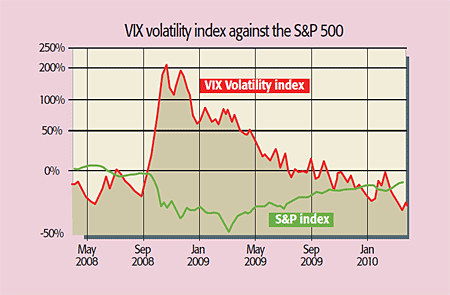Two ways to play volatility
The market may be on the verge of a relapse. And this time, even those with a diverse range of investments could lose out. So, to survive the next dip, it's worth considering all options. Enter the VIX volatility index.

Get the latest financial news, insights and expert analysis from our award-winning MoneyWeek team, to help you understand what really matters when it comes to your finances.
You are now subscribed
Your newsletter sign-up was successful
Want to add more newsletters?

Twice daily
MoneyWeek
Get the latest financial news, insights and expert analysis from our award-winning MoneyWeek team, to help you understand what really matters when it comes to your finances.

Four times a week
Look After My Bills
Sign up to our free money-saving newsletter, filled with the latest news and expert advice to help you find the best tips and deals for managing your bills. Start saving today!
Is the market on the verge of relapse? One man who's been a step ahead since the credit crunch began thinks so Morgan Stanley strategist Teun Draaisma. Having warned his clients of the downturn in 2007, at the end of 2008 he turned bullish, calling for a "full house buy". Now he sees another turn looming. "We think the market peak is near, and expect 2010 to show a volatile whipsaw pattern in equities When the next earnings recession hits, perhaps in 2012, we expect equities to complete the bear market that started in 2000."
Worse, investors could be facing another bout of "death by correlation". Two years ago, even investors with classically diversified portfolios lost an average of 33.3%. Diversification failed us all. So, to survive the next dip, it's worth considering all options. Enter the VIX. While the rest of the market (bar bonds) slumped, it quietly returned 72.6%.
What is the VIX?
The VIX is a gauge of fear in the stockmarket. In other words, it reflects how nervous investors are collectively and what they believe might happen next. It was created by Professor Robert Whaley to measure the premiums paid by investors who buy 30-day option contracts tied to the price of stocks traded on the S&P 500. These options allow investors to buy or sell stocks at a future date at a set price.
MoneyWeek
Subscribe to MoneyWeek today and get your first six magazine issues absolutely FREE

Sign up to Money Morning
Don't miss the latest investment and personal finances news, market analysis, plus money-saving tips with our free twice-daily newsletter
Don't miss the latest investment and personal finances news, market analysis, plus money-saving tips with our free twice-daily newsletter
The mechanics can get technical quite quickly. But in principle these options boil down to insurance policies for investors worried about a big market move. For example, a "put" option allows an investor to dump stocks at a pre-determined price should the market plummet. The price of that insurance varies the option "premium" goes up or down and that's what the VIX tries to capture for whole groups of stocks.
As Mr Market gets more nervous, option premiums rise and so does the VIX. "It's analogous to buying fire insurance," says Whaley. "If there's reason to believe an arsonist is in your neighbourhood, you're going to be willing to pay more for insurance." So, trading alongside the US stockmarket from 2.30pm to 9pm London time, the VIX provides a useful, timely snapshot of sentiment. And plenty of professional investors have cottoned on to this fact.
Does it work?
The VIX has a pretty good track record. It spiked in 1998 when infamous hedge fund Long-Term Capital Management collapsed. It spiked again after the September 11th terrorist attacks. And at its peak 80.86 on 20 November 2008 the fear index was up 249% for that year-to-date.
Since then, the VIX has fallen a long way. It's currently at just 17.50, a good way below the 30 level that many VIX watchers reckon signals trouble. But the next time we have a panic, and a capitulation in share values, history has shown that the VIX could double, triple, or more. Therefore, although it's a somewhat unusual investment the VIX pays no dividend and, unlike shares, its cheapness or otherwise can't be measured using traditional ratios such as price/earnings or cash flows a couple of trades are worth adding to your armoury.

How can you invest in the VIX?
There are two relatively straightforward ways to play the fear gauge. First, spreadbetting. All you need is a City Index, CMC Markets or IG Index account. For example, for my CMC Markets account, the relevant ticker is "VOL INDEX Apr 10 M", currently priced at 19.50. This bet will track the price of the nearest dated month (in this case, April) and, when it expires, roll into the next available contract month.
If you don't fancy spreadbetting losses can rack up pretty fast if you don't know what you're doing you can buy an exchange traded fund (ETF) instead. This shares some of the same dynamics as the spreadbet, but can be bought and sold like a plain vanilla share. The ETF in question, the S&P 500 VIX Short-Term Futures Index, buys the near-dated futures contract for you every month. Its ticker symbol is VXX. However, note that because it trades on the US market, you'll need a share-dealing account that allows overseas trades to buy and sell the VIX in this way.
A hidden cost to watch out for
With both the spreadbet and the ETF, you need to watch for negative "roll yield". We've flagged up this issue in MoneyWeek before in relation to commodity ETFs (for more, see Moneyweek.com/etfguide.aspx). The "roll" arises from the sale of an expiring futures contract and the purchase of the next available future. The "yield" is the price difference between those two contracts. For example, the March VIX contract expired on 17 March 2010. The final "settlement price" of this contract was $16.68. The April contract (the one that the investor then automatically buys via the ETF to keep a position running) was priced at $20.10 on the same date. So rolling the contract over would have incurred a $3.42 cost. That's the roll yield. And in our example, it's negative.
Unfortunately, negative roll yields have been the norm for over a year now. So an investor takes a whack every time they roll over the contract. Hold a position for a long time and this really mounts up. In the last 12 months, the VIX has fallen 60%, while holders of the VXX have seen an 83% fall in their funds (see graph). But don't let that put you off. A number of analysts expect roll yields to turn positive. And, either way, VIX trades still provide useful, if unusual, insurance.
Theo Casey is investment director of the Fleet Street Letter. For more on FSL, see www.investingwithfsl.co.uk .
Get the latest financial news, insights and expert analysis from our award-winning MoneyWeek team, to help you understand what really matters when it comes to your finances.
Theo is a former financial writer and editor, having written for reputable titles such as Euromoney Institutional Investor and Redwood Publishing. He has also appeared on-screen with Al Jazeera, BBC and CNBC and on MoneyWeek Theo covered funds, share tips and stockmarkets. He also edited the country's oldest newsletter with Lord Rees-Mogg for four years. Theo now runs his own content marketing agency for financial companies, and he is a seasoned CISI-qualified investment adviser.
-
 Should you buy an active ETF?
Should you buy an active ETF?ETFs are often mischaracterised as passive products, but they can be a convenient way to add active management to your portfolio
-
 Power up your pension before 5 April – easy ways to save before the tax year end
Power up your pension before 5 April – easy ways to save before the tax year endWith the end of the tax year looming, pension savers currently have a window to review and maximise what’s going into their retirement funds – we look at how
